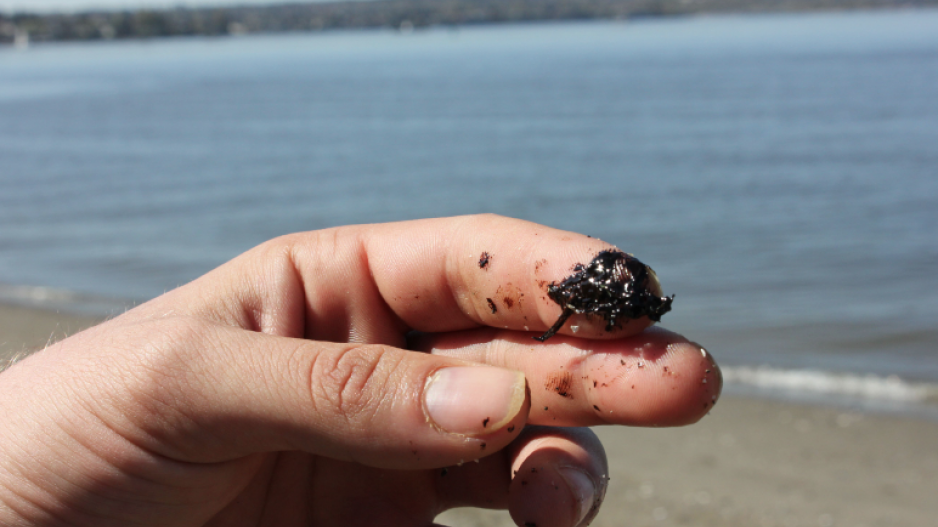Last week’s bunker fuel oil spill in Vancouver’s English Bay has demonstrated the Canadian federal government’s lack of world-class marine spill response preparedness, said British Columbia Premier Christy Clark
The 18-barrel spill, which originated from a grain bulk carrier, could affect pipeline proposals exporting heavy oil off the B.C. coast, she said in a news conference April 10.
“There won’t be any expansion of heavy oil out of this port or any other port in British Columbia until we get a world class spill response,” she said.
Enbridge Inc. has federal government approval for its Northern Gateway crude oil export and condensate import pipeline project at Kitimat but is still working on a number of conditions imposed by the National Energy Board.
Kinder Morgan Canada Inc. is currently involved in an NEB hearing for an expansion of its Trans Mountain pipeline to 890,000 barrels per day from 300,000 barrels a day.
When it released its conditions, the province said it wasn’t ready for a pipeline expansion as the federal government didn’t have the resources and the response plan in place to ensure it is prepared to respond to a spill and “they have proven that in the last couple of days,” said Clark.
“We don’t have a world class spill response to look after the ships and the risk that are there now,” she said. “The federal government needs to step up.”
The B.C. premier said she has been raising the need for a world-class spill response with the federal government for a number of years to no avail. “If there is any good that comes of this it will be that it is the wake up call that pushes our Coast Guard into action to make sure that plan is there and that we are ready.”
The resources have to be in place and the Coast Guard has to decide it wants to take the lead or it needs to relinquish that lead to the province, said Clark. “Somebody needs to do a better job of protecting this coast and the Coast Guard hasn’t done it.”
Clark said she was disappointed in the time it took the Canadian Coast Guard, which is in charge of co-ordinating spill efforts, to get booms in place in a port where they have the resources, boats, booms and tows. “There is nowhere on the West Coast of Canada that is better protected and has more assets in place and they couldn’t get them there for six hours,” she said.
“We are going to have to come up with a better way of doing this and if this means that in the future the Coast Guard is relieved of their lead in this and starts taking direction from the province, then perhaps that’s a better way to do it.”
However, in a detailed statement issued April 12, the Coast Guard defended its response. It said it took emergency crews less than 1½ hours to be on the scene after the official activation order when the Coast Guard determined the spill was more serious than the port of Vancouver had initially believed. The order was issued three hours after a recreational boater first notified the Coast Guard of an oil slick in Vancouver harbour (5:10 p.m.) and the Coast Guard informed its emergency management partners of the sighting.
The industry-funded Western Canada Marine Response Corporation, which conducts clean up operations under the direction of the Coast Guard, was officially activated at 8:06 p.m. on April 8 and crews were on the scene at 9:25 p.m. with multiple vessels, it said. Working overnight, they had booms in place by 6 a.m. April 9.
According to the Coast Guard, within 36 hours, 80% of the spill was not only contained, but was recovered. A National Aerial Surveillance Program flight during the afternoon on April 11 confirmed that the oil on the water had been contained, and that approximately 0.3 litres of non-recoverable oil was remaining on the water, said the agency. An estimated 2,700 litres (18 barrels) of oil leaked from the grain carrier.
A union representing Coast Guard communications officers also weighed in, raising concerns about the scheduled closure of the Vancouver Marine Communications and Traffic Services Centre (MCTS). The closure threatens the government’s ability to prevent shipping accidents and the capacity to provide a rapid response, said Joie Warnock, Unifor’s western director.
“The coast guard plays a vital role protecting our waters. Without a monitoring station in Canada’s busiest port, our ability to respond to the next oil spill is dramatically reduced,” she said.
The MCTS Centre in Vancouver harbour is scheduled to close on May 6, along with the Regional Marine Information Centre (RMIC). In the event of an emergency, the RMIC notifies responders and government agencies so an immediate response can be mobilized.
The cuts are part of broader budget cuts to the West Coast marine safety network, according to Unifor. The Coast Guard will no longer provide anchorage assistance to ships — including oil tankers — when the MCTS centre closes next month.
“When a serious pollution incident happens, quick notification and response is key to limiting the spread of pollutants,” said Allan Hughes, western director of Unifor Local 2182. “The Harper government is dismantling the West Coast’s prevention and emergency response system that has been in place for decades.”




